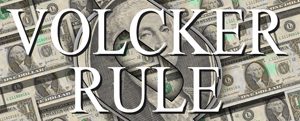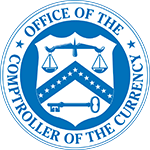 An alternative to the Volcker rule passed the House of Representatives.
An alternative to the Volcker rule passed the House of Representatives.
The House of Representatives passed H.R. 4790, the Volcker Rule Regulatory Harmonization Act.
The Volcker rule forbids banks from engaging in “proprietary trading”- or trading in their own accounts- but critics of the rule say its implementation has been cumbersome and incurs on legitimate banking market making activities.
Republican from the State of Texas Jeb Hensarling gave a near seven-minute speech in support of the bill before it passed.
Hensarling is Chairman of the House Financial Services Committee, where the bill originated, and he has been a chief critic of the Volcker rule.
Of the new bill, Hensarling said: “Will streamline the regulatory authority” of the Volcker and provides “a framework that will provide increased regulatory clarity for entities that must comply with the Volcker rule, It does by consolidating rule making authority and interpretation with the Federal Reserve board and for purposes of examination and enforcement designated the primary regulator for covered entity as the sole regulator in those capacities. The challenge here Mr. Speaker is that some entities can have as many as five regulators interpreting the rule and five regulators enforcing the rule.”
 Indeed, one issue with the Volcker rule is that there are five regulators: The Federal Reserve, The Securities and Exchange Commission (SEC), the Commodities Futures Trading Commission (CFTC), the Office of Comptroller of Currency (OCC), and the Federal Deposit Insurance Corporation (FDIC).
Indeed, one issue with the Volcker rule is that there are five regulators: The Federal Reserve, The Securities and Exchange Commission (SEC), the Commodities Futures Trading Commission (CFTC), the Office of Comptroller of Currency (OCC), and the Federal Deposit Insurance Corporation (FDIC).
Each, depending on the entity, could have oversight of interpreting and enforcing.
This creates mass confusion in the eyes of Hensarling who said, “You can’t abide by the rule if you don’t know what the rule is.”
This bill will streamline that authority mostly in the hands of the Federal Reserve. The Federal Reserve will now have sole interpretative authority and primary enforcement authority of the Volcker rule.
 “The challenge here is, Mr. Speaker, is that some entities can have as many as five different regulators interpreting the Volcker Rule, and five different regulators enforcing the Volcker Rule. Sometimes they conflict with each other, Mr. Speaker, and frankly the entity doesn’t know what to do. You cannot have an economy based on the rule of law when, frankly, you don’t know what the law says. And so, the gentleman from Arkansas brings a very simple bill to the House floor that says‘we’re going to have one, one regulator in charge of interpreting the rules, and the primary prudential regulator is going to be in charge of enforcing the rule.’ It’s commonsense; it creates efficiency.” Hensarling stated.
“The challenge here is, Mr. Speaker, is that some entities can have as many as five different regulators interpreting the Volcker Rule, and five different regulators enforcing the Volcker Rule. Sometimes they conflict with each other, Mr. Speaker, and frankly the entity doesn’t know what to do. You cannot have an economy based on the rule of law when, frankly, you don’t know what the law says. And so, the gentleman from Arkansas brings a very simple bill to the House floor that says‘we’re going to have one, one regulator in charge of interpreting the rules, and the primary prudential regulator is going to be in charge of enforcing the rule.’ It’s commonsense; it creates efficiency.” Hensarling stated.
The bill passed out of the House of Representatives by a vote of 300-104.
Hensarling also noted that the bill enjoyed an air of bi-partisanship because it was introduced by a Republican Congressman from the State of Arkansas, French Hill, and a Democrat from the State of Illinois, Bill Foster.
The bill now heads to the Senate for a similar process.
Hensarling announced last year he will be retiring at end of this term in January 2019.









